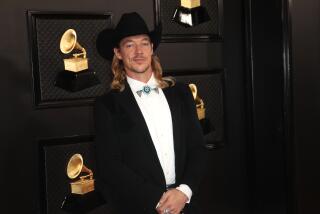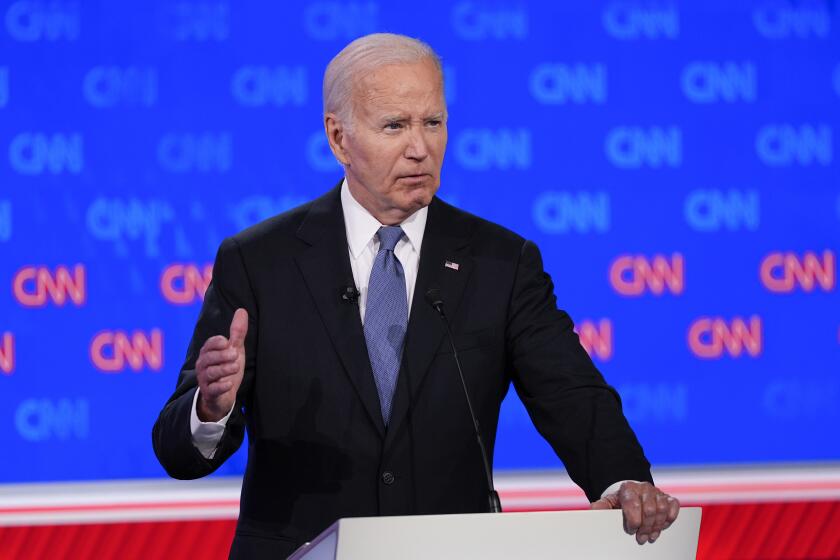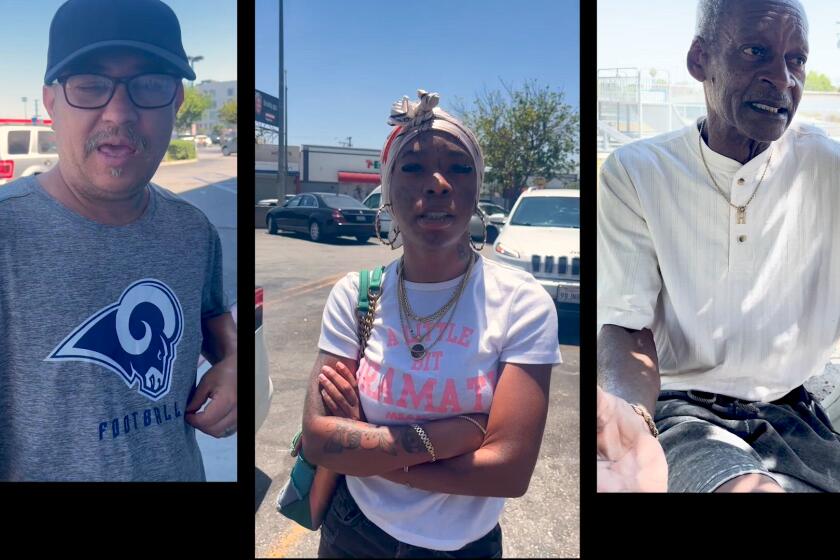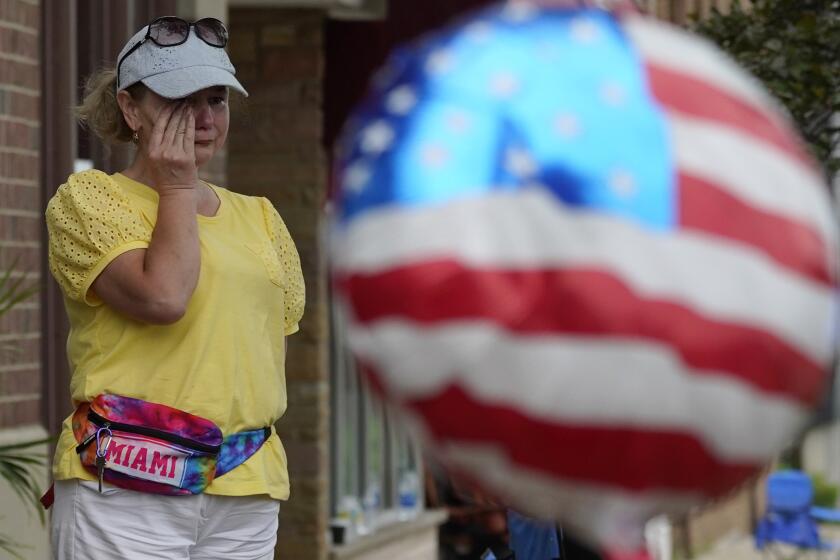X-Rated Industry’s Ad Attacks Censorship : Public relations: Firms join forces to fight a crackdown on adult entertainment. Their announcement in the New York Times defends free speech.
For the first time in recent memory, the reclusive pornography industry has launched a public campaign against a government crackdown on the makers of adult videos.
The industry kicked off the campaign last week with a full-page ad in the western edition of the New York Times that quotes President Bush.
“Ironically, on the 200th anniversary of our Bill of Rights, we find free speech under assault throughout the United States,” says the ad, quoting the President’s May 4 remarks about the debate over politically correct speech on college campuses.
“What the President doesn’t say is that in many cases our own government is behind the assault,” the ad reads.
The ad was placed by the Woodland Hills-based Free Speech Legal Defense Fund, which a representative said is made up of a group of 100 organizations whose primary business is adult entertainment.
The crackdown on the pornography business has resulted in more than 40 searches and seizures at Los Angeles-area companies since March, 1990. Four of those searches and seizures have resulted in criminal indictments in Dallas, Las Vegas and Tulsa, Okla.
Mark Schwed of Bragman & Co., a Beverly Hills media-relations firm hired three months ago to help launch the counterattack against government prosecutors, said the New York Times ad will be followed by more newspaper ads, as well as appearances on radio talk shows by industry representatives in Los Angeles, Phoenix and elsewhere.
In an effort to tap the audience that rents X-rated videocassettes--about 400 million last year--Schwed said the industry is placing the fund’s logo on video box covers and including an educational trailer at the beginning of each video.
“These guys have never banded together before,” Schwed said of the industry. “If they don’t get together, they aren’t going to survive.”
“My clients know this is a war in the same way that the Kuwaitis knew they were in a war,” said John H. Weston, a Beverly Hills attorney who represents the Adult Video Assn. The association is made up of production and distribution companies as well as individuals who make and perform in X-rated movies.
The government crackdown is being spearheaded by Patrick Trueman, 42, a former GOP congressional candidate from Minnesota who heads the Child Exploitation and Obscenity Section in the Department of Justice. The unit operates with an annual budget of about $1.7 million and a staff of 20--including 13 lawyers--up from a staff of six when the section was initiated in 1987.
Trueman says he is carrying out Atty. Gen. Dick Thornburgh’s mandate that pornographers “would be pursued in every state in the union.”
Weston argues that much of the material being seized by the government is mainstream adult material that can be rented at the local video store. “Essentially, what the government has decided to do is to eliminate all erotic material from America,” Weston said.
While the government has periodically launched investigations of the pornography business in the past, this one has sent a wave of fear through the industry because of the tactics being employed. Instead of initiating obscenity investigations in Los Angeles, where many of the films are made and where juries are traditionally more tolerant, the investigations are occurring in such places as Broken Arrow, Okla., where it is believed that it will be easier to obtain obscenity convictions.
The Justice Department has also been threatening multiple prosecutions in different states, which increases tremendously the cost of fighting the cases. Some companies fear that, even if they win, the defense costs could bankrupt them.
The attack comes at a time of vulnerability in the industry, when price-cutting of adult videos has slashed into the profit margins of many companies.
Trueman acknowledges that the Justice Department has been tough on porn and does not apologize for the fact that legal action is being pursued in out-of-the-way places. “We’ll let the people in those communities decide what is obscene and what isn’t.”
Formation of the free speech fund and going public with its campaign against the government represent a departure for the usually reclusive producers of X-rated entertainment, who occupy nondescript storefronts, many in the San Fernando Valley area, that a casual observer would never connect to the business of sex.
Other elements of the industry campaign may include hiring a lobbyist on Capitol Hill so the fund can keep track of legislation and make its opinions known to lawmakers. According to Schwed, the fund has already approached several lobbying firms about representation.
Signifying a new solidarity of purpose in the industry, one Adult Video Assn. member company has even sent a letter to producers and performers stating that it will only work with signatories to the association and the Free Speech Legal Defense Fund.
But the industry has not come out of the closet completely. The New York Times ad does not identify the group’s ties to pornography. In fact, a list of artistic works that the ad says have been “Banned in America” does not include any X-rated titles. The list focuses on such things as the effort to censor the music of 2 Live Crew in Florida, as well as Robert Mapplethorpe’s photographic exhibition in Cincinnati.
Also listed as banned--meaning that attempts were made to censor them somewhere in the United States--are books such as “The Catcher in the Rye,” “Garfield: His Nine Lives” and Doris Day’s autobiography.
The only clue connecting the ad to the pornography business is a line at the bottom of the list of these “banned” works that reads, “Anything by the adult-entertainment industry.”
The purpose of citing mainstream artistic works in the ad, campaign representatives said, is to underscore their belief that the crackdown on pornography is just part of a wider assault on free speech in general that threatens everyone’s rights.
The ad includes a 900 number that can be called for a “free speech message.” Narrated by X-rated actress Christy Canyon, the message accuses the government of “trying to censor what you hear, say and think, even in the privacy of your own home.”
The charge for the call is $9.95, which the fund says will be used to buy more ads.
Asked whether the ad is deceptive in not disclosing the connection to adult entertainment, one person involved with the campaign who asked not to be identified said, “Absolutely not.” This person said the press kits and other material being distributed make it clear who is behind the campaign.
Asked whether someone might call the 900 number not knowing the campaign is about pornography, the unidentified person replied: “It’s not about pornography. It’s about free speech.”
More to Read
Start your day right
Sign up for Essential California for news, features and recommendations from the L.A. Times and beyond in your inbox six days a week.
You may occasionally receive promotional content from the Los Angeles Times.






